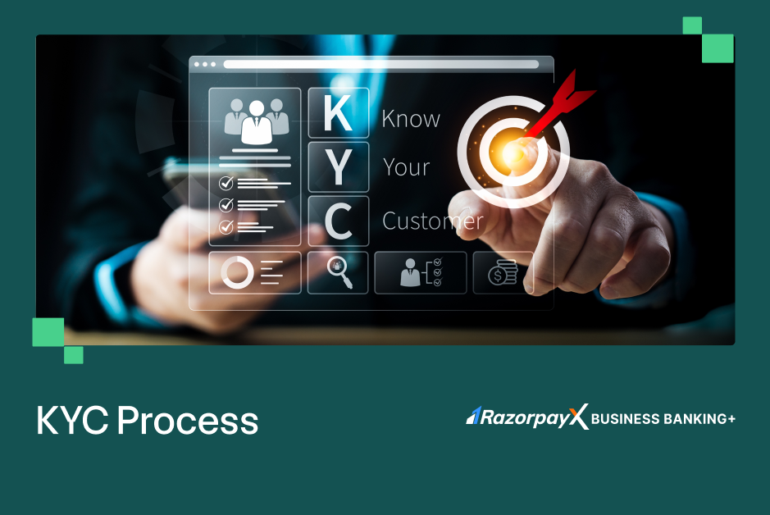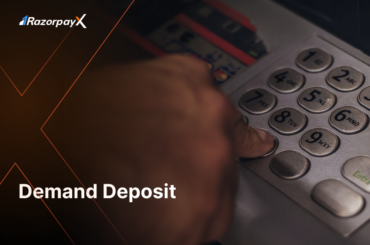If you’ve ever opened a business banking account, savings account or signed up for a financial service, you’ve probably heard of KYC process. But what does the KYC meaning actually include, especially for businesses?
First off: KYC process = Know Your Customer process
It is a regulatory requirement to authenticate the identity of customers and prevent illegal activities like money laundering, tax evasion, and fraud. Here’s the catch – the know your customer process isn’t just a checkbox to tick. It’s an essential compliance step for businesses and merchants that helps build trust, stay aligned with regulations, and grow sustainably.
Whether you’re a startup, a private limited company, or a large-scale enterprise – understanding the know your customer procedure is no longer a choice.
What is the KYC Process?
The KYC process is the structured way financial institutions, fintech companies, and service providers validate who you are and assess the risk involved in dealing with you. Before we dive deeper into the KYC process, let’s quickly revisit the KYC meaning—it’s about knowing your customer’s identity, risk, and background. Think of it as a compliance-driven introduction.
At its core, the KYC process involves:
- Collecting ID documents (like PAN, Aadhaar, business registration proof)
- Verifying these documents through manual or automated means
- Screening against global watchlists, sanction lists, or PEP (Politically Exposed Persons) lists
- Conducting ongoing monitoring for suspicious activity
There are different layers depending on whether you’re an individual or a business, and the level of risk assessed. For businesses, this is where KYC for companies comes into the picture.
With a basic understanding of the KYC meaning and why it matters, let’s explore the various methods businesses can use to verify identities
Types of KYC
There’s no one-size-fits-all approach to a KYC process. Here are the most common types:
1. Paper-Based KYC
This is the traditional model where customers submit physical copies of their identity and address proof. It’s slow and manual but still used in legacy systems.
2. Digital KYC
Here, the user uploads scanned copies or photos of KYC documents via a portal. The verification may still be semi-manual.
3. Video KYC
This involves real-time video calls where the user displays their KYC documents and answers identification questions. It offers better user convenience while enabling businesses to comply remotely.
4. Electronic KYC (eKYC)
This is the fastest and most preferred method today. Powered by platforms like UIDAI, electronic KYC uses Aadhaar-based OTP authentication or biometric data to verify identity instantly. Regulators are actively pushing for electronic KYC due to its accuracy, security, and speed.
5. In-Person KYC (IPV)
In some regulated sectors, in-person verification is mandatory. This requires the customer to be physically present before an authorised representative who validates the identity and documents. This method is still used in high-risk categories like large transactions, high-value loans, and certain insurance verifications.
6. Central KYC (CKYC)
CKYC is a centralised repository managed by the government, where customer details are stored after their KYC is done once with any financial institution. The goal is to avoid repeated KYC for companies offering different services. It’s especially helpful for mutual funds, banks, and insurance companies.
7. Aadhaar Offline KYC
In this method, users can download their Aadhaar XML file and share it securely with a business. This ensures consent-driven, offline identity sharing without needing live database access.
Each method offers a different balance of speed, security, and regulatory fit. Businesses often combine two or more depending on their risk category and customer profile.
Who Needs to Do KYC?
KYC isn’t just for high-value customers or financial institutions. Here’s who it applies to:
- Banks and NBFCs onboarding new account holders
- Payment gateways and wallets verifying merchants
- Cryptocurrency platforms ensuring user compliance
- Lending institutions assessing borrowers
- Marketplaces onboarding sellers
- Any platform that deals with money movement
If you’re a business, especially in financial services, KYC isn’t just a best practice—it’s mandatory.
How Does the KYC Process Work?
Let’s say you’re onboarding with a platform like Razorpay. The know your customer process typically involves the following steps:
- Submission of Documents: For corporate KYC documents, required are PAN, company incorporation certificate, address proof, bank details, and authorized signatory ID proof. You can explore the full list of KYC documents for companies on Razorpay Docs.
- Verification: Depending on your business type, verification might involve eKYC checks, video calls, or uploading documents on a dashboard.
- Approval or Rejection: Once documents are validated, your account is either approved or flagged for more information.
- Continuous Monitoring: The process doesn’t end with approval. Businesses are monitored for suspicious transactions or changes in beneficial ownership.
For entities like private limited companies, private limited company KYC documents also include director details, company GST, and board resolutions.
Importance of KYC for Companies, Businesses & Merchants
Here’s the real deal – a KYC process isn’t just about regulation. It’s about creating a business that’s built on trust. The KYC meaning for businesses goes beyond just checking boxes—it’s about making informed decisions based on verified identity and risk data.
1. Fraud Prevention
When you know exactly who you’re dealing with, you drastically reduce the risk of fraud, identity theft, and money laundering.
2. Faster Onboarding
With automated KYC process flows, platforms can onboard vendors, employees, or partners in minutes, not weeks.
3. Regulatory Compliance
Failing to comply with KYC norms can invite heavy penalties, suspension of licenses, or even criminal prosecution.
4. Improved User Experience
Modern KYC tools like electronic KYC provide a seamless onboarding experience. No paperwork, no delays.
5. Access to Financial Products
Banks and fintech platforms won’t allow you to open a current account or apply for credit unless KYC is complete.
6. Scalability
When your KYC is clean and verified, your business can expand faster with less friction across partners, platforms, and jurisdictions.
Real-Time Compliance Challenges for Startups
Startups often move fast—sometimes faster than compliance can keep up. While speed is an advantage in product development and customer acquisition, it can turn into a liability when it comes to KYC compliance.
Here’s where many of them struggle:
- Incomplete documentation during rapid onboarding: In the rush to onboard customers or vendors quickly, startups may overlook collecting critical identity documents or miss verifying their authenticity.
- Not maintaining updated records of signatories: As startups grow, their leadership structure can evolve rapidly. Without consistent updates to authorized signatories or beneficial ownership details, businesses can quickly fall out of compliance.
- Using tools not built for scale or regulation: Many early-stage companies rely on spreadsheets or basic CRM systems to track compliance. These tools are prone to errors and lack the audit trails or access control required by financial regulators.
- Failing to align internal policy with national KYC norms: Startups often focus on product-market fit, leaving compliance as an afterthought. Without a clear internal policy that reflects regulatory updates from the RBI, SEBI, or international AML bodies, the company is exposed to risk.
- Lack of dedicated compliance personnel: It’s common for operations or finance teams to wear multiple hats. Without someone solely focused on regulatory hygiene, small gaps in the KYC process can grow into significant compliance breaches.
- No process for KYC refresh cycles: KYC isn’t a one-time task. Businesses need to re-verify users at regular intervals. Startups that lack automation here often miss mandatory refresh deadlines.
- Overlooking global KYC requirements when expanding: Entering new markets without understanding local KYC laws can lead to penalties, delayed launches, or blocked transactions.
What’s needed? A plug-and-play system, but also audit-ready. One that allows startups to move fast while staying fully compliant, with automation at its core and scalability built in from day one.
Embedding KYC into Product Workflows
For digital-first businesses, embedding KYC into the product journey is critical. Examples include:
- Verifying users during app sign-up
- Auto-verifying bank details during withdrawals
- Flagging account edits that could signal fraud
RazorpayX allows APIs that trigger KYC checks during business events – like vendor onboarding or salary setup – without leaving your core product.
Auditing & Reporting Best Practices
Beyond verification, businesses also need to prove that they’re compliant. A few best practices:
- Maintain logs of all submitted KYC documents and timestamps
- Use systems that support auto-generated audit trails
- Schedule internal compliance reviews quarterly
- Train teams to identify suspicious onboarding patterns
Documentation isn’t optional – it’s protection.
The Future-Ready KYC Stack for Businesses
If you’re planning ahead, here’s what your KYC stack should include:
- eKYC with biometric and OTP options
- AI-enabled fraud detection
- AML integration for financial flows
- APIs for triggering re-verification dynamically
- Blockchain record-keeping for tamper-proof logs
Businesses that invest in future-proof KYC systems today will outpace compliance hurdles tomorrow.
Industry-Specific KYC Considerations
KYC processes differ significantly by sector:
- Lending & Credit: Focuses on creditworthiness, income verification, and fraud score analysis.
- Cryptocurrency: Includes identity checks along with stringent AML and transaction tracing.
- Healthcare: Verifies practitioner credentials, licenses, and insurance compliance.
- E-commerce: Streamlined KYC for companies handling high-volume merchant onboarding, returns, and payouts.
Having a KYC engine that can adapt to your industry’s needs is key.
KYC in the Global Context
Planning to scale internationally? Each region has its own regulatory lens:
- Europe (GDPR & AMLD): Prioritizes data privacy and consent-based KYC procedures.
- US (FinCEN & KYC Act): Focuses on UBO tracking, cross-institutional sharing.
- Asia (RBI, MAS, HKMA): Active regulation around digital KYC and onboarding innovation.
Global-ready businesses need KYC stacks that are multilingual, multi-format, and multi-compliance certified.
Common Mistakes in KYC Implementation
Even great businesses falter if they mishandle compliance:
- Using outdated document templates
- Missing re-verification deadlines
- Lack of training for front-line teams
- Weak audit trail and document storage
All of this adds up to risk—regulatory, reputational, and operational.
Wrapping Up: Make KYC Your Growth Enabler
Don’t treat KYC like a regulatory formality—it’s a growth enabler.
With smarter onboarding tools and automated compliance frameworks, businesses can use KYC to:
- Build deeper trust
- Ensure faster processing
- Stay audit-ready
- Reduce fraud exposure
- Increase conversion rates with better user experience
RazorpayX isn’t just a platform to send or receive money. It’s built with an embedded compliance suite:
- Automated KYC checks and UBO validations
- Real-time dashboard of pending or failing KYC cases
- API integrations to sync business logic with KYC workflows
- Role-based access to documents and reports
That means less time preparing for audits, and more time running your business.
RazorpayX helps businesses integrate KYC seamlessly into their workflows. From real-time verifications to compliance dashboards – you get a system that scales with you.
It’s simple: Know your customer. Trust your process. Grow your business.
FAQs
1. What is the full KYC meaning in a business context?
KYC, or the Know Your Customer process, refers to the process of verifying the identity and background of clients. For businesses, KYC ensures legal compliance, builds trust, and safeguards against fraud and financial crimes.
2. How often should businesses update KYC records?
The know your customer process isn’t a one-time exercise. Depending on the risk category of the customer or business, KYC records must be updated periodically—typically every 2 to 5 years, or sooner if there are changes in business structure.
3. Is electronic KYC (eKYC) legally valid in India?
Yes. eKYC is legally recognized and widely adopted in India, especially for Aadhaar-based verifications. It is fast, secure, and accepted by banks, NBFCs, and fintech platforms.
4. Can startups use RazorpayX for managing the know your customer procedure?
Absolutely. RazorpayX offers a robust KYC compliance suite tailored for fast-growing businesses. It includes automated verification, API-driven workflows, and real-time dashboards to simplify compliance management.





